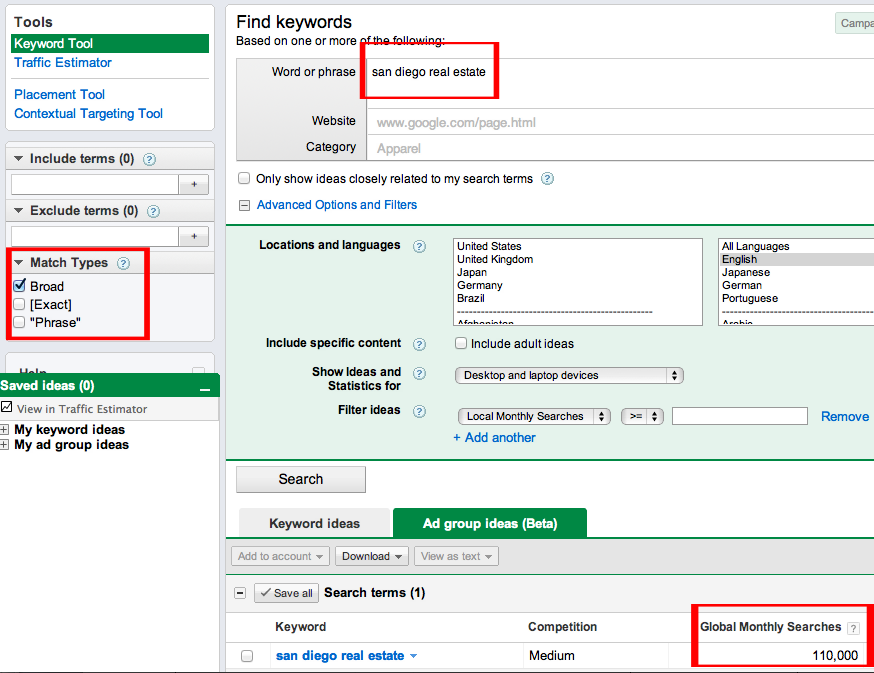You are viewing our site as an Agent, Switch Your View:
Agent | Broker Reset Filters to Default Back to ListKeyword Research: The Wrong Way And The Right Way - Part 1
May 21 2012
 Search Engine Optimization – including keyword research – has dominated the headlines for the last year or so. The fuel behind the SEO fervor is due to the recent changes Google has made to its ranking algorithms a.k.a. Panda and Penguin. And for good reason.
Search Engine Optimization – including keyword research – has dominated the headlines for the last year or so. The fuel behind the SEO fervor is due to the recent changes Google has made to its ranking algorithms a.k.a. Panda and Penguin. And for good reason.
As website owners yourselves, you may have seen your site get knocked down (or out of first page results), on the other hand, you may have seen your results improve. Hopefully it's the latter, but regardless, understand that basic SEO principals remain as important as ever.
Talking about SEO strategy, most people assert that "content is king" and they're absolutely correct. However, before diving head first into your blog posts and developing site content, it's fundamentally critical to start first with keyword research.
But beware the so-called "SEO Gurus" out there hocking their services or products promising you a first page result. Some are good, some pure snake oil. But what continues to dumbfound me – whether intentionally misleading or simply uninformed – when it comes to keyword research what I see is typically dead wrong.
Keyword Research: The Wrong Way
Some SEO experts will urge you to find keyword phrases with massive traffic (monthly searches) and low levels of competition (other people trying to optimize a page for that same phrase). They tell you that if you do this, you'll rank on the first page of Google results for your phrase.
To accomplish this, they'll say to use (or they will on your behalf) the Google Keyword tool, and enter the phrase you want to rank for in order to find out how many people are searching for this phrase per month.

In the screen shot above I've searched for 'San Diego Real Estate.' This keyword returned 110,000 monthly searches (bottom left red box). Seems pretty good in terms of possible traffic for that phrase, doesn't it?
Let's come back to this in a moment.
You'll typically be instructed next to make sure your heavily searched keyword has very low competition. To determine this, it was likely suggested you do a Google search for your phrase and look at the 'Results' number that was returned under the search box. A high number means that it's a very competitive phrase and therefore you should probably stay clear of it.
Note in the screen grab below, our phrase 'San Diego Real Estate' resulted in about 34,100,100 results/pages with this phrase. UH OH, that seems like pretty stiff competition so I better ditch this keyword right? WRONG!

This approach to key word research will lead to only one thing: your competitors will get all of the web traffic (and therefore prospective clients) that should really be yours.
Here's why...
You'll notice in our keyword tool search that I had the 'Broad' phrase option selected (red box on the left). What does this mean? By selecting this option you are asking Google to give you the approximate amount of monthly searches that contain the words 'San Diego Real Estate.' But you're also asking Google to return results that contain other words that someone may likely have used in their search query.
In addition, by using the Broad match option, you are also asking for results of queries that use the words of your phrase in any order.
Here are some examples of Broad match results: 'I love San Diego and Real Estate,' 'Real Estate homes for sale San Diego.'
These results are useless if you want to rank for your specific phrase.
Further notice, that under the Broad match selector that I could have chosen 'Phrase' as my option. When you select Phrase, you are asking Google to give you results that contain 'San Diego Real Estate' in the proper order but also results that include other words.
Here are a couple examples of Phrase match results: 'I Love San Diego Real Estate,' 'San Diego Real Estate Is Hot,' etc.
These results are also useless for your purposes.
Let's move on to the search results number of 34 million. This number tells you approximately how many web pages contain the words San Diego Real Estate. It's a misleading number because it could mean that the words San Diego Real Estate appear on the page, however may not have any connection of any kind to each other.
To illustrate this, a page could be talking about Texas Real Estate and refer to a vacation the author of the post took to San Diego. Further, the author of this page could be trying to optimize for a keyword that has nothing to do with these four words – maybe this page is really about 'family vacations' and in the copy the author refers to 'San Diego,' and separately mentions 'Real Estate' in Texas.
34 million is only telling you the number of pages that have these four words on them and therefore has nothing to do with competition levels for a keyword or SEO in general.
Another thing to note about this number is that it fluctuates in a big way. Do a test for yourself. First make sure you're logged out of Google and type in any search term and record the number returned. Then, perform the same search a few days later. Odds are the results will be very different. This obviously indicates that this number is unreliable, and therefore you shouldn't base your keyword research on it. IGNORE IT!
When the SEO expert tells you that 'low competition' is mandatory in order to rank for your keyword, they're also wrong.
This is why....
In the world of SEO the only thing that really matters is ranking as the number one spot for your keyword (ok, maybe number two) because this is where the traffic will come from. Site traffic falls off dramatically by the time you get down to the third result and beyond.
Here's a perfect analogy that really underscores this given to me by Shane Melaugh.
Let's suppose you've entered a car race where you'll get to drive a brand new Porsche. In this race you have 50 competitors and they'll all be driving Chrysler K-Cars (not to knock K-Cars of course). Although you have 50 competitors, odds are almost guaranteed you will finish in number one spot.
Now, you have a second race coming up, this time with only two competitors. You're still in your Porsche but the other two are driving Formula 1 racecars. In this race you're pretty much guaranteed to finish dead last.
As mentioned above, the only thing that matters in SEO is that you rank number one or two on the results page for your keyword. Therefore, it doesn't matter if you have two or 2,000 competitors. The only thing to care about is if you can beat out the number one ranked page and take over that spot for yourself.
Check back tomorrow for Part 2 of this article, when Erik Goldhar shows us the right way to do keyword research.









